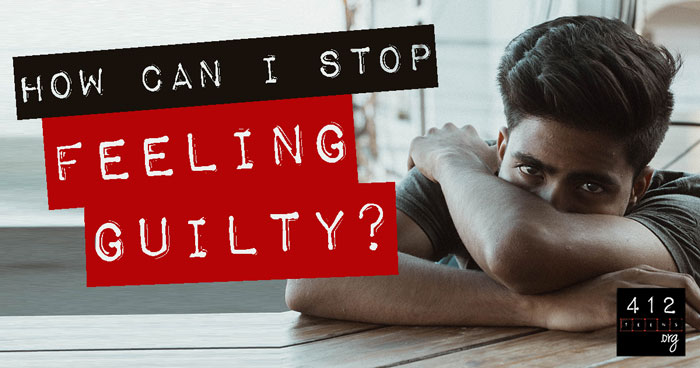How can I stop feeling guilty?

"For all have sinned and fall short of the glory of God." —Romans 3:23
Sometimes it feels like we can't do anything right. It can feel overwhelming to keep track of everything. Don't read that book. Don't watch that movie. Talk to these people and not those people. Don't date that person. Don't date at all. Be sure your entertainment time doesn't cut into your time with God. There are seemingly so many expectations. So many things we end up feeling shame over.
Sometimes these feelings become so overpowering that we can't tell what's even real anymore. We just start to feel guilty over everything, and it's hard to tell whether that guilt is genuine. Is it the Holy Spirit convicting or just us beating ourselves up? How can we tell the difference between true guilt and false guilt?
Innate Guilt Against God
"As it is written, there is none righteous, not even one." —Romans 3:10
One definition of "guilt" is the state of having committed an offense, crime, violation, or wrong against a moral or penal law. There are many places in the Bible that affirm our innate guilt against God's holiness (Romans 3:10, 23). This is also known as our sin nature.
When Adam and Eve sinned, they broke humanity's relationship with God, and people have naturally spiraled into rebellion against a holy and just God ever since. True guilt is a sign of our corrupted and spiritually lost state of existence. Our guilt, in this sense, is why we need Jesus as our Savior (Romans 3:21-26).
Our Sensitivity to Sin
"The Helper, the Holy Spirit, whom the Father will send in my name, he will teach you all things and bring to your remembrance all that I have said to you." —John 14:26
Although we're born into a state of guilt against God that can be forgiven (John 3:16-17), all of our random feelings of guilt and shame about "bad things" are likely to remain. And those feelings can be confusing to interpret.
As children of God, saved by the blood of Jesus Christ, we've become new creations, considered righteous in Christ (1 Corinthians 5:17)—no longer guilty. Truly, once we have received forgiveness from God, our relationship with God is restored, and there's no need to continue feeling guilt or shame about past sins (Romans 8:1).

That said, after we have chosen to follow Christ, our sensitivity to sin will begin to get stronger. That's because the Holy Spirit has come to live in our hearts as a helper and guide (John 14:26). The presence of the Spirit is often in constant opposition to our sinful tendencies (Romans 7:15-20), so we feel that incongruence of emotions.
If we give in to temptations to sin and then understand that we've done something wrong, that's a good and normal response (Ephesians 4:20-24). It means our conscience is still in line with the Spirit (1 Thessalonians 5:19; 1 Timothy 1:19).
What is true guilt?
"For godly grief produces a repentance that leads to salvation without regret, whereas worldly grief produces death." —2 Corinthians 7:10
True guilt comes from the Holy Spirit and is accompanied by a desire to repent and change. As Christians, we're no longer controlled by our sinful nature. Instead, we have the Spirit who convicts us when we go against God's Word and guides us to better choices.
"Thanks be to God that though you were slaves to sin, you became obedient from the heart to that form of teaching to which you were committed, and having been freed from sin, you became slaves of righteousness." —Romans 6:17-18
When we recognize that we've gone against God's will or feel guilty about sin, that's not a result of God's hatred, but instead a sign of His love. Just as an earthly father disciplines his children to correct their errors, so much more our Heavenly Father desires to lovingly guide us in the direction of spiritual maturity.
"We had earthly fathers to discipline us, and we respected them; shall we not much rather be subject to the Father of spirits, and live? For they disciplined us for a short time as seemed best to them, but [God] disciplines us for our good, so that we may share His holiness. All discipline for the moment seems not to be joyful, but sorrowful; yet to those who have been trained by it, afterwards it yields the peaceful fruit of righteousness." —Hebrews 12:9-11
However, sometimes we feel guilt even though we haven't done anything wrong—and that's called false guilt.
What is false guilt?
"For whenever our heart condemns us, God is greater than our heart, and he knows everything." —1 John 3:20
False guilt is when we feel guilt, shame, or regret over something that isn't sinful or is morally neutral. False guilt can originate from a variety of different places, which is one of the reasons why it can be so hard to identify. But one of the hallmarks of false guilt is a sense of deep shame.
Satan's Lies
One of the origins of false guilt is Satan himself. Revelation 12:10 calls the devil "the accuser," and it's an apt description. While the Holy Spirit who dwells in us is stronger than the devil (1 John 4:4), Satan still looks for ways to manipulate and destroy our faith.
"Be sober-minded; be watchful. Your adversary the devil prowls around like a roaring lion, seeking someone to devour." —1 Peter 5:8
Satan will remind us of our worst failings and sins, distracting us so much that we begin to forget about the grace and forgiveness we've been given by God (1 John 3:20).
Lies of a Weak Conscience
A second origin for false guilt is what 1 Corinthians 8:7-13 refers to as a "weak conscience." A believer with a weak conscience doesn't realize their true freedom in Christ. They may not fully understand that they no longer need to feel guilty about past sins. Or they may be unsure what sin really is, thus leading them to believe that something harmless or morally neutral is, in fact, sinful.
A believer with a weak conscience likely hasn't gathered all the facts as to how we're supposed to live as Christians, or they may have been taught something contrary to biblical principles. Mental illness or anxiety can also add complexity to accepting or fully comprehending God's truth about sin and forgiveness.
When we're uninformed about what the Bible teaches, then our brains often send us contradictory signals that are difficult to decipher. This confusion leads to an abrupt false sense of guilt over even the smallest things.

How can I stop feeling guilty?
For True Guilt
"If we confess our sins to him, he is faithful and just to forgive us our sins and to cleanse us from all wickedness." —1 John 1:9 (NLT)
To just "do better next time" is a poor response to conviction from the Holy Spirit. Yes, making better choices next time is a part of it, but we should first confess our sin to God, acknowledge our wrongdoing, genuinely ask for His forgiveness, and ask Him to help us in the future (2 Corinthians 7:10). He's already aware of what has happened and will definitely forgive you, so there's nothing to fear (1 John 1:9).
True, godly sorrow isn't regret over "getting caught." True, godly sorrow comes from realizing we've hurt the God who loves us unconditionally. The cure for true guilt is to accept the all-encompassing forgiveness, love, and pure grace of a holy God.
For False Guilt
"Let us then with confidence draw near to the throne of grace, that we may receive mercy and find grace to help in time of need." —Hebrews 4:16
The cure for false guilt can be found in God's grace. If we've already searched our hearts and confessed any sin we've found, and yet we're still being tortured by some sense of guilt, we need to remember two things:
- Even if you don't understand why you're feeling or doing what you do, you have a God who does. He searches your heart and tests your mind (Jeremiah 17:8-9), and He will never misunderstand your intentions or motivations.
- All the sins you regret are forgivable (1 John 1:9; Psalm 103:12). Once we've confessed our sins, God has promised to wash them away. Gone. Wiped from record—100%.
As believers, there's nothing we can do to make God stop loving us (Romans 8:38-39), and once we are saved, there's nothing we can do to lose our salvation (Ephesians 1:13).
One of the best ways to curb feelings of false guilt is to recognize it as false in the first place. How do we do that? By studying the character and words of God in the Bible. The better we know God, the more we talk to Him, the more intimate our relationship with Him becomes, and the easier it will be to recognize if a feeling or thought is coming from God, from ourselves, or from the enemy.
"You, O Lord, are good and forgiving, abounding in steadfast love to all who call upon you. Give ear, O Lord, to my prayer; listen to my plea for grace. In the day of my trouble I call upon you, for you answer me." —Psalm 86:5-7
ALSO SEE:
- How do I stop thinking of God as imposing and angry?
- What is the conviction of sin?
- What is the conscience?
- Will God forgive me no matter what?
- What does it mean that a Christian is a new creation?
- How can I receive forgiveness from God?
- What does the Bible say about forgiving yourself?
- If I'm forgiven, why not continue to sin?
- Feeling Loved When You Don't Feel Loveable
- How can I know if I'm hearing God, hearing Satan, or hearing my own voice?


TL;DR
There are two types of guilt: true guilt and false guilt. False guilt comes from various sources—one of them being Satan (1 Peter 5:8). He'll remind you of your worst failings, sins, and shame. Ignore this guilt! True guilt is not compelled by shame, but instead comes from the Holy Spirit. True guilt leads to a desire to repent and change (2 Corinthians 7:10). The better we know God, the more we talk to Him, the more intimate our relationship with Him becomes, and the easier it will be to recognize if a feeling or thought is coming from God, from ourselves, or from the enemy (Psalm 86:5-7).

Writer/Editor: September Grace
September is an avid film nerd from growing up on weekend trips to Universal Studios Hollywood. She is passionate about the intersections of Christian spirituality, faith, and storytelling in popular culture. Outside of 412teens and digging up obscure horror flicks from the 2000s, she works as a freelance developmental editor and acquisitions consultant while comforting her clingy feline floof, Faust, from the anxiety of existence.

Vlogger: Melinda
Melinda loves making music that helps people "feel things they've forgotten about" and likes talking about things that ignite wonder and encourage emotional/mental/spiritual health. She enjoys learning and discussing ways that people relate and how we can best take care of ourselves.
